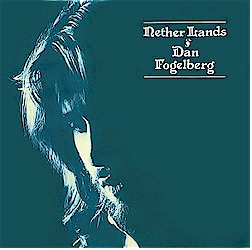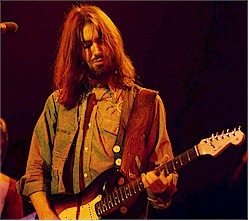 A few years back, our Editor-in-Chief Jeff Giles (y’all) wrote a “You Again” column/review on a posthumously released Dan Fogelberg record called Love in Time. He prefaced the review with an admission (okay, he devoted half the column to the fact) that he really didn’t care much one way or another about Fogelberg’s music, and was fully prepared to rain down a steady torrent of critical excretion on the album if it sucked, as he’d anticipated it would. Turns out, though, it didn’t. He liked the record, and said so, rather eloquently (there is little Jeff does that isn’t eloquent. Even his belches sound like Shakespeare). A year after the fact, Fogelberg’s widow, Jean, wrote Jeff a very nice thank-you note in the Comments section.
A few years back, our Editor-in-Chief Jeff Giles (y’all) wrote a “You Again” column/review on a posthumously released Dan Fogelberg record called Love in Time. He prefaced the review with an admission (okay, he devoted half the column to the fact) that he really didn’t care much one way or another about Fogelberg’s music, and was fully prepared to rain down a steady torrent of critical excretion on the album if it sucked, as he’d anticipated it would. Turns out, though, it didn’t. He liked the record, and said so, rather eloquently (there is little Jeff does that isn’t eloquent. Even his belches sound like Shakespeare). A year after the fact, Fogelberg’s widow, Jean, wrote Jeff a very nice thank-you note in the Comments section.
In the period between the review’s posting and Jean’s note, however, the Comments were set upon by a clutch of rabid Fogelberg faithful (“DanFans,” as they identified themselves; “Fogelfarts” as some others identified them) who pilloried our poobah with insults, vituperation, and virtual rocks ‘n’ garbage:
Your own language in this blog entry speaks to either your lack of adequate vocabulary or a desire to come across as “cool and edgy.” In fact, you only come across as a mean sort of “wanna be.”
I have never in my life read anything so musically misinformed as Mr. Giles article. Tin ear does not begin to describe it.
Do they actually pay these mutes?
… in order to appreciate that and what Dan was saying, one would have to have a view of the world larger than their own backyard …
There was even a post that took Jean to task for “padding her pockers [sic] using Dan’s fame and fanbase,” before accusing Dan Fogelberg of a tabloid-worthy romance with an elementary school teacher in North Carolina.
I found the whole thing hilarious, even jumped in a couple times, virtual Hattori Hanzo unsheathed, to defend Jeff’s honor. I also expressed interest in hearing the record myself, which is fairly odd, because, at that point, I detested much of Fogelberg’s music, the same way I detested stomach cramps and migraines. My bad attitude had nothing to do with my tin ears, inherent meanness, world view, or any attempts on my part to be cool or edgy. His work always came off as super-earnest, sonically empty, mountain-man-cum-sub-Laurel-Canyon twaddle, a musical equivalent to bland porridge—the Cream of Wheat of the Seventies singer/songwriter era. He might’ve occupied the same cultural space as Jackson Browne and the Eagles, but he lacked the former’s bite and the latter’s detached charisma.
 As it turned out, though, Jeff was right—Love in Time is not a bad record. Fogelberg even covered “Birds,” one of Neil Young’s loveliest songs, and he did it well. I was surprised—both in the quality of the record and in my reaction to it.
As it turned out, though, Jeff was right—Love in Time is not a bad record. Fogelberg even covered “Birds,” one of Neil Young’s loveliest songs, and he did it well. I was surprised—both in the quality of the record and in my reaction to it.
When I started collecting vinyl again, I noticed how many Fogelberg records turned up in the used bins and collector’s crates I was digging through on the weekends—made sense, though, considering how many albums he’d sold in his heyday. I decided to collect them, to revisit his oeuvre and see if my bitter loathing of his fey muse and wimptastic delivery would hold up under a fresh hearing. I got everything from his debut, 1972’s Home Free, through 1987’s Exiles—eleven albums (including his Greatest Hits and first duo record with Tim Weisberg, Twin Sons of Different Mothers). Paid, in total, about 15 bucks for everything. The deal I made with myself was that I’d give each a good, critical listen (two or three initial pass-throughs, plus more if I thought a record warranted it), and I’d write about anything I liked. Kinda like my old “Can’t Say No” column, only if I didn’t care for the stuff, no one would know.
Fogelberg’s first three albums—Home Free, Souvenirs, and Captured Angel—came and went without much danger of my writing about them. Everything I’d remembered and disliked about Fogelberg came through in somewhat less-than-thrilling relief. With the exception of “Part of the Plan,” from Souvenirs, I was predictably underhwhelmed.
Then came Nether Lands; or, more accurately, “Nether Lands,” the title track of Fogie’s 1977 platter. And that, my friends, is when ye olde card turned.
The sweep of the song—the strings, the horns, the tension and release, the upward-looking sentiment in the lyrics—is breathtaking. If I find he didn’t write the first verse while actually “high on this mountain / the clouds down below,” I will be sorely disappointed.
Off in the nether lands
I heard a sound
Like the beating of heavenly wings
And deep in my brain
I can hear a refrain
Of my soul as she rises and sings
Anthems to glory and
Anthems to love and
Hymns filled with early delight
Like the songs that the darkness
Composes to worship the light
 Translation: peyote is a hell of a drug.
Translation: peyote is a hell of a drug.
Usually, I make fun of such sentiments, such Á¼ber-earnest, heavy-handind pontificatin’. But for some reason, it all works. It’s a perfect storm of warmth and flourish—the ultimate sensitive mountain-man package, and I was not repulsed. I was amazed. I began to question everything I’d ever thought about the Seventies, about singer/songwriters, about mountains and light worship and anthem writing. I looked deep into my soul, down the furthest, bat-infested portal, and found, under a pile of discarded sour mash bottles and thumbed-through porn, a small child, a living creature of pure wonderment, dressed for hiking, listening to a loop of the second verse of “Fire and Rain” on an old Walkman, giggling and drooling onto his L.L. Bean footwear. I’m fucked, I thought to myself.
So what does Fogie do after dropping us off on the mountaintop? He shows us what gravity is—namely, a natural phenomenon by which physical bodies attract with a force proportional to their masses, that force being unrequited love. “Once Upon a Time” ploughs familiar ground (soil enriched by disparate organics we’ve always known and continue to know, from “You Don’t Know Me” to “Hold on to the Nights” to “The One that Got Away” and beyond), and does so with chiming acoustic strumming and Eaglesy “woos” and Fogelberg pronouncing the word your as yer, like a good Midwestern boy. It’s a tale of regret: “She’s always on your mind, but once upon a time you had her there.” Dear God, how many of us have spent considerable chunks of time with that sentiment hanging over us?
Side One marshals on, with more philosophizin’. “Lessons learned are like bridges burned,” he sings on “Lessons Learned.” “You only need to cross them once.” This, of course, is bullshit; I forgot all about quadratic equations until my kid needed homework help, and I had to look it all up again. He goes back to the mountain for “Loose Ends,” whose chorus recaptures the sweep of the title track, through the haunting lift of its melody, which meets its equal in the lyric:
And the chords struck at birth
Grow more distant
Yet, we strike them again and again.
And we plead and we pray
For a glimmer of day
As the night folds its wings
And descends
Exposing the loose ends
There you have it, boys and girls— life and death, cradle to grave, in eight lines, amplified from the mountaintop like Moses (the O.G. sensitive man, though a bit more uptight than most) hanging out on Mt. Sinai.
Side Two begins with the California soft-rock-by-numbers of “Love Gone By.” Yes, it gets points for having a pulse (think Jackson Browne’s “Walking Slow,” on the otherwise down-tempo Late for the Sky), and yes, the lap steel gee-tar and piano chording are fine touches, but Danno’s falsetto vocalizin’ can barely keep up with the band, and he bears down awkwardly on the chorus. Better is the hopelessly dour “Promises Made,” with its 12-string strum and heartbreak lyrics:
 Feeling forsaken
Feeling forsaken
Broken in two
How did this ever happen to you?
Taken for granted
Bruised and betrayed
Lonely survivors
These promises made
This from a man who likely had access to as many willing groupies as any other sensitive singer/songwriter of the day. I think he even toured with the Eagles at some point, and they had an abundance of nubile not-so-lonely survivors following them around. Poor guy.
“Give Me Some Time” has a lovely light bossa nova rhythm, and the requisite gut-string guitar, with vocals mixed softer than the flutes. Its lyric is perfect sensitive-Seventies-troubadour poetry; it’s also the polar opposite of “Promises Made”: he has the willing chick but he’s “got cause to be wary / For so long I’ve had to carry / The weight of another soul.” In all, it’s a very light-sounding way to dump the woman in front of you in favor for the old love you can’t have anymore.
Again, what’s there not to hate about this shit? Yet I simply cannot resist. And the whole thing ends perfectly. “False Faces” brings back the orchestral sweep of “Nether Lands” for five tingle-inducing minutes. Dominic Frontiere’s arrangement is the star here, so flawlessly executed, moving the sundown horizon itself to accommodate a small chorus of Fogelbergs and J.D. Southers. Never mind that the lyrics rail against the life of a traveling musician and the people (critics? Women?) who betray him along the way (bitch, bitch, bitch, that Fogie). The song is a wonder, the music putting muscle on Fogelberg’s fragile accusations, making even the smallest sentiments seem epic.
So, where to go from here? I suppose Twin Sons of Different Mothers is next, then Phoenix (which has “Longer” on it, and I loathe “Longer”) and The Innocent Age. If all goes well, I’ll letcha know how I fare. If this “Fogelberg Reconsidered” thing ends here, though, you’ll know I didn’t fare well.





Comments